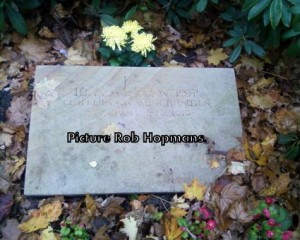Ribbentrop, Joachim Ullrich Friedrich Willy von, the son of Oberstleutnant Richard Ulrich Joachim Ribbentrop a career Army officer and his wife, Johanne Sophie Hertwig, was born in Wesel,  Germany, on 30-04-1893.
Germany, on 30-04-1893.

 He had one brother, Lothar. Educated at a boarding school at Switzerland he also spent time in France and England as a child. In 1911 he began working as clerk with a German importing form based in London before moving to Canada where he worked as a timekeeper on the reconstruction of the Quebec Bridge and the Canadian Pacific Railroad. This was followed by employment as a journalist in New York City and Boston. On the outbreak of the First World War Ribbentrop returned to Germany where he joined the German Army.
He had one brother, Lothar. Educated at a boarding school at Switzerland he also spent time in France and England as a child. In 1911 he began working as clerk with a German importing form based in London before moving to Canada where he worked as a timekeeper on the reconstruction of the Quebec Bridge and the Canadian Pacific Railroad. This was followed by employment as a journalist in New York City and Boston. On the outbreak of the First World War Ribbentrop returned to Germany where he joined the German Army.  While serving with the 125th Hussar Regiment he won the Iron Cross
While serving with the 125th Hussar Regiment he won the Iron Cross ![]() . Ribbentrop’s father was a Oberstleutnant in the Weimar Reichswehr
. Ribbentrop’s father was a Oberstleutnant in the Weimar Reichswehr ![]() . After being seriously wounded
. After being seriously wounded  in 1917 Ribbentrop joined the War Ministry and was a member of the German delegation that attended the Paris Peace Conference. After leaving the German Army Ribbentrop worked as a salesman for the French firm of Pommerey in the Rhineland. He later became a partner in a Berlin sales agency. In May 1932 Ribbentrop joined the National Socialist German Workers Party (NSDAP)
in 1917 Ribbentrop joined the War Ministry and was a member of the German delegation that attended the Paris Peace Conference. After leaving the German Army Ribbentrop worked as a salesman for the French firm of Pommerey in the Rhineland. He later became a partner in a Berlin sales agency. In May 1932 Ribbentrop joined the National Socialist German Workers Party (NSDAP)  . He quickly moved up the hierarchy and in 1933 became Hitler’s foreign affairs adviser. Joseph Goebbels (did you know) and Martin Bormann disliked Ribbentrop very much. The following year he established the Ribbentrop Bureau an organization that eventually had a staff of 300 people. Adolf Hitler (did you know) appointed Ribbentrop as the ambassador to London in August, 1936. The foreign minister Joachim von Ribbentrop was such a cocky that they called him “Ribbensnob”. At home his wife Annelies von Ribbentrop-Henkell was the boss and adviser in different political affairs. (see Did you know)
. He quickly moved up the hierarchy and in 1933 became Hitler’s foreign affairs adviser. Joseph Goebbels (did you know) and Martin Bormann disliked Ribbentrop very much. The following year he established the Ribbentrop Bureau an organization that eventually had a staff of 300 people. Adolf Hitler (did you know) appointed Ribbentrop as the ambassador to London in August, 1936. The foreign minister Joachim von Ribbentrop was such a cocky that they called him “Ribbensnob”. At home his wife Annelies von Ribbentrop-Henkell was the boss and adviser in different political affairs. (see Did you know)
 On 20-07-1923 son Rudolf was born ,
On 20-07-1923 son Rudolf was born , 
 on 20-07-1922, daughter Bettina and later, Adolf, Ursula and Barthold. Her parents allowed them a large house in Berlin Dahlem, Lentzeallee 7-9.
on 20-07-1922, daughter Bettina and later, Adolf, Ursula and Barthold. Her parents allowed them a large house in Berlin Dahlem, Lentzeallee 7-9.

 Rudolf became a Hauptsturmführer in the 12thSS Panzer Division “Hitlerjugend” , nickname “Baby Division”
Rudolf became a Hauptsturmführer in the 12thSS Panzer Division “Hitlerjugend” , nickname “Baby Division”  under SS Brigadeführer, Hugo Kraas
under SS Brigadeführer, Hugo Kraas 
 , here on the right and wounded five times during the war but survived till now. He was wounded by a fragment in the upper right arm 30-05-1941, a bullet wound in left forearm 02-09-1941, a shot in his back 05-02-1943, again wounded in the back by strafing enemy fighter-bomber 03-06-1944 and by a shell fragment in Mouth 20-12-1944. As commander of I./SS-PzRgt 12. He commanded this Abteilung until the Division surrendered to the Americans on 08-05-1945. The Division losses during the fighting in Normandy were severe, in the three months from June to September, 55 officers, 229 NCOs and 1.548 had been killed. A further 128 officers, 613 NCOs and 3.684 had been wounded with 58 officers, 182 NCOs and 2.012 reported missing. This was a combined total of 241 officers, 1.024 NCOs and 7.244 men. In all, the 12thSS Panzer Division Hitlerjugend suffered a total of 8.569 casualties out of a strength of 20.540 men; a casualty rate of 42%. It had also lost 94% of its armour and almost all of its artillery. Ribbentrop’s main objective was to persuade the British government not to get involved in Germany territorial disputes and to work together against the the communist government in the Soviet Union. When Ribbentrop presented his credentials to George VI
, here on the right and wounded five times during the war but survived till now. He was wounded by a fragment in the upper right arm 30-05-1941, a bullet wound in left forearm 02-09-1941, a shot in his back 05-02-1943, again wounded in the back by strafing enemy fighter-bomber 03-06-1944 and by a shell fragment in Mouth 20-12-1944. As commander of I./SS-PzRgt 12. He commanded this Abteilung until the Division surrendered to the Americans on 08-05-1945. The Division losses during the fighting in Normandy were severe, in the three months from June to September, 55 officers, 229 NCOs and 1.548 had been killed. A further 128 officers, 613 NCOs and 3.684 had been wounded with 58 officers, 182 NCOs and 2.012 reported missing. This was a combined total of 241 officers, 1.024 NCOs and 7.244 men. In all, the 12thSS Panzer Division Hitlerjugend suffered a total of 8.569 casualties out of a strength of 20.540 men; a casualty rate of 42%. It had also lost 94% of its armour and almost all of its artillery. Ribbentrop’s main objective was to persuade the British government not to get involved in Germany territorial disputes and to work together against the the communist government in the Soviet Union. When Ribbentrop presented his credentials to George VI  von 05-02-1937, the British were outraged when he gave the Hitler salute. He also upset the British government by posting Schutz Staffel (SS) guards outside the German Embassy and by flying swastika flags on official cars. On 04-02-1938, Ribbentrop replaced Constantin von Neurath
von 05-02-1937, the British were outraged when he gave the Hitler salute. He also upset the British government by posting Schutz Staffel (SS) guards outside the German Embassy and by flying swastika flags on official cars. On 04-02-1938, Ribbentrop replaced Constantin von Neurath

 as Germany’s foreign minister. He worked closely with Adolf Hitler in his negotiations with the British and French governments, in March 1939 is the Agreement was signed in room 105 of the Führerbau in Munich on the Königsplatz, the room didn’t change at all, and in August 1939 they arranged the signing of the
as Germany’s foreign minister. He worked closely with Adolf Hitler in his negotiations with the British and French governments, in March 1939 is the Agreement was signed in room 105 of the Führerbau in Munich on the Königsplatz, the room didn’t change at all, and in August 1939 they arranged the signing of the

more spectacular Nazi-Soviet Pact. In 1940 Hitler once again began to consider invading the Soviet Union and he sent Ribbentrop to negotiate a new treaty with Japan. On 25th September, 1940, Ribbentrop sent a telegram to Viacheslav Molotov,

 the Soviet foreign minister, informing him that Germany, Italy and Japan were about to sign a military alliance. Ribbentrop pointed out that the alliance was to be directed towards the United States and not the Soviet Union. Molotov already knew about the proposed German-Japanese Pact. Richard “Ramsey” Sorge,
the Soviet foreign minister, informing him that Germany, Italy and Japan were about to sign a military alliance. Ribbentrop pointed out that the alliance was to be directed towards the United States and not the Soviet Union. Molotov already knew about the proposed German-Japanese Pact. Richard “Ramsey” Sorge,
 a German journalist working in Tokyo, was a Soviet spy and had already told Molotov that Adolf Hitler was involved in negotiations with Japan. In Sorge’s view, the pact was directed against the Soviet Union but it was not until December, 1940, that he was able to send Molotov full details of Operation Barbarossa. Ribbentrop became a background figure during the Second World War but was arrested and charged with war crimes in June, 1945.
a German journalist working in Tokyo, was a Soviet spy and had already told Molotov that Adolf Hitler was involved in negotiations with Japan. In Sorge’s view, the pact was directed against the Soviet Union but it was not until December, 1940, that he was able to send Molotov full details of Operation Barbarossa. Ribbentrop became a background figure during the Second World War but was arrested and charged with war crimes in June, 1945.
Death and burial ground of Ribbentrop, Joachim Ullrich Friedrich Willy von. “Hitler’s Evil Spirit”.




Joachim von Ribbentrop denied knowledge of German concentration camps and racial extermination policies, but was found guilty at the Nuremberg War Crimes Trial and was hanged on 16-10-1946, age 53, by Master sergeant, John Chris Woods.
Like all in the Nuremburg process sentenced to death men, Wilhelm Keitel,  Julius Streicher, Alfred Jodl,
Julius Streicher, Alfred Jodl,  Wilhelm Frick, Fritz Sauckel, Alfred Rosenberg, Arthur Seyss Inquart, Ernst Kaltenbrunner and Hans Frank and Hermann Goering (did you know), and Ribbentrop were secretly transferred in Army trucks to the Ostfriedhof, Eastern Cemetery of Munichon 16-10-1946 and cremated. The coffins had faked names and they gave Streicher’s coffin ironical a Jewisch name. The same night four Generals, an American, an Englishman, a Frenchman and a Russian were secretly driven straight to the closest bridge, the Reichenbachbrücke over the river Isar and they scattered the ashes downstream. The family Henkell of his wife Annelies put a remembrance stone on their family grave, on the Stadtfriedhof of Biebrich in Wiesbaden.
Wilhelm Frick, Fritz Sauckel, Alfred Rosenberg, Arthur Seyss Inquart, Ernst Kaltenbrunner and Hans Frank and Hermann Goering (did you know), and Ribbentrop were secretly transferred in Army trucks to the Ostfriedhof, Eastern Cemetery of Munichon 16-10-1946 and cremated. The coffins had faked names and they gave Streicher’s coffin ironical a Jewisch name. The same night four Generals, an American, an Englishman, a Frenchman and a Russian were secretly driven straight to the closest bridge, the Reichenbachbrücke over the river Isar and they scattered the ashes downstream. The family Henkell of his wife Annelies put a remembrance stone on their family grave, on the Stadtfriedhof of Biebrich in Wiesbaden.
A historian reported that the gravestone of the Ribbentrop’s has moved from Wiesbaden to the Kommunal Friedhof Velbert-Langenberg near the grave of Ilja Ribbentrop, born von Münchhausen, the wife of SS Obersturmführer Rudolf von Ribbentrop  the son of the Ribbentrops. She died very old age 90 on 01-02-2010
the son of the Ribbentrops. She died very old age 90 on 01-02-2010  and son Rudolf now 94 in 2015 is still alive living in the neighborhood of Velbert-Langenberg.
and son Rudolf now 94 in 2015 is still alive living in the neighborhood of Velbert-Langenberg.































Leave a Reply